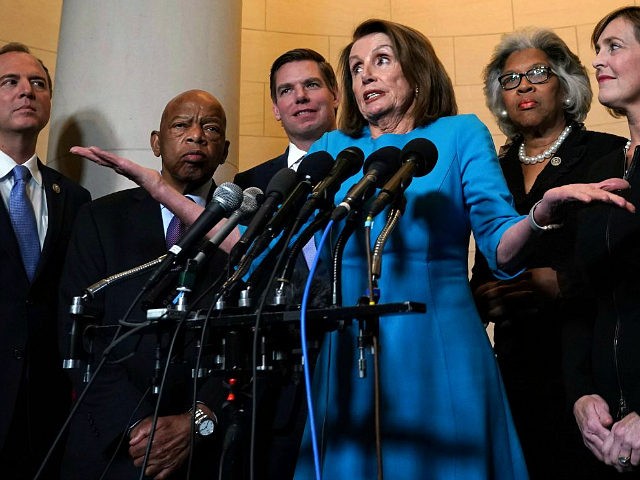At least seven of the 23 incumbent House Democrats backed by the U.S. Chamber of Commerce have lost their races, and another one might.
Democrat Reps. Xochitl Torres Small (NM), Abby Finkenauer (IA), Kendra Horn (OK), and Joe Cunningham (SC) have each been confirmed to have lost their races by the Associated Press, and according to vote totals, Democrat Reps. Anthony Brindisi (NY), TJ Cox (CA), and Harley Rouda (CA) currently trail their GOP challengers in yet uncalled races. Democrat Rep. Ben McAdams (UT) keeps trading places with his GOP challenger as well in a tight race, meaning that when all the dust settles, at least seven and potentially eight of the Democrats backed by Chamber of Commerce are going to have lost their reelection bids.
Despite the poor showing from the Chamber’s controversial foray into Democrat endorsements, support from the D.C.-based business lobby may have helped a few Democrats keep their seats by just a few points — thereby helping to preserve a narrow Democrat majority in the House.
With support from the Chamber, Democrat Rep. Angie Craig (MN) beat GOP challenger Tyler Kistner by just two points, 48 percent to 46 percent. Democrat Rep. Abigail Spanberger (VA) beat GOP nominee Nick Freitas, 51 to 49 percent. Democrat Rep. Cindy Axne (IA) beat the GOP’s David Young 49 percent to 48 percent, and Democrat Rep. Haley Stevens (MI) beat GOP nominee Eric Esshaki 50 percent to 48 percent.
The full list of Democrat endorsements from the Chamber does not include other seats Republicans retook from Democrats in some places around the country, such as Minnesota or New York. Regardless of whatever happens with challenges by President Donald Trump to the top-of-ticket results that have media organizations declaring former Vice President and Democrat nominee Joe Biden the president-elect — Trump is challenging those results in several states — the Republicans significantly outperformed expectations down-ballot, especially in House races, even in the face of opposition from the Chamber. Official prognosticators like the Cook Political Report had projected the Democrats would pick up House seats, but they were all wrong: Republicans net-gained seats, and may have, depending on a few outstanding races, significantly cut into the Democrats’ majority — even without Chamber support.
The Chamber’s support for Democrats was matched by donors’ support for the leftist candidates. Business Insider reported:
According to the Center for Responsive Politics, [Democrat Rep. Antonio] Delgado significantly outraised and outspent [Kyle] Van De Water. As of October 14, Delgado raised $5.6 million, spent $2.4 million, and had $3.3 million in cash on hand, while Van De Water raised $130,381, spent $76,488, and had $53,893 in cash on hand.
The Chamber’s shift towards Democrats comes as more business groups denounced President Trump’s curbs on migration and visa workers. Establishment media sites often portray the curbs as human rights controversies, but the federal supply of foreign labor is a huge economic factor for the companies and investors.
For example, on June 22, Trump issued an executive order temporarily barring the inflow of visa workers preferred by Fortune 500 executives. In response, the pro-migration New York Times printed a pro-migration op-ed by the Chamber CEO Thomas Donohue:
If you want businesses to grow and the economy to rebound, you allow skilled workers to come here legally to work and contribute to the well-being of our nation; you don’t lock them out. If you want the next revolutionary start-up to be founded in America, you welcome foreign students; you don’t threaten to upend their lives and send them home during the middle of a pandemic. And if you want children to grow up to reach their potential and live their American dream, you give them the tools and certainty to succeed; you don’t kick them out of the only country they’ve ever known.
The 23 Democrats supported by the Chamber scored roughly 70 percent in the Chamber’s list of “key business votes” during 2019. Several are members of the Democrat “Blue Dog” caucus that says its members are “pragmatic Democrats, appealing to the mainstream values of the American public.”
The Chamber’s decision to back 23 Democrats prompted much turmoil in the Chamber, including the departure of its veteran strategist Scott Reed, and pushback from some of the 50 independent state chambers who work with the D.C.-based U.S. Chamber of Commerce.
Breitbart News reported September 29:
One insider called the Chamber “an elitist organization,” while another said their Democrat endorsements were “what happens when the Washington swamp and Wall Street get together in Nancy Pelosi’s conference room and make a deal.”
The number of small businesses paying dues to the Chamber stands at less than 7,000 today, according to sources with knowledge. In its heyday, the Chamber had about 130,000 small businesses paying dues.
In response, Trump and Vice President Mike Pence reportedly criticized the Chamber in a phone call. House Minority Leader Kevin McCarthy (R-CA) has publicly said he does not want the Chamber’s endorsement, characterizing the group as sell-outs.
Overall, open-ended legal migration is praised by business and progressives partly because migrants’ arrivals help transfer wealth from wage-earners to stockholders.
Migration moves money from employees to employers, from families to investors, from young to old, from children to their parents, from homebuyers to real estate investors, and from the central states to the coastal states.
Migration also allows investors and CEOs to skimp on labor-saving technology, sideline U.S. minorities, ignore disabled people, exploit stoop labor in the fields, short-change labor in the cities, impose tight control and pay cuts on American professionals, corral technological innovation, undermine labor rights, and get many progressive journalists to cheerlead for Wall Street’s priorities.
The US Chamber of Commerce may end up endorsing perhaps 20 Democrat in districts needed by the GOP's push for a House majority, says Politico.
Partly because some Dems scored high on the Chamber's 'key votes' list.https://t.co/X00YTwaDzi— Neil Munro (@NeilMunroDC) August 27, 2020

COMMENTS
Please let us know if you're having issues with commenting.